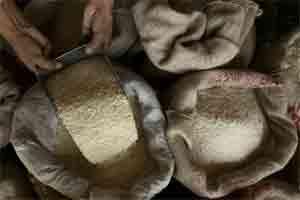 Bangalore, Jul 10: The Congress government is all set to roll out “Anna Bhagya Yojane,” its flagship scheme to supply rice at Re one per kg to below poverty line (BPL) families, on Wednesday, hoping that the Centre's food security ordinance would ease the burden of purchasing costly rice once it is implemented.
Bangalore, Jul 10: The Congress government is all set to roll out “Anna Bhagya Yojane,” its flagship scheme to supply rice at Re one per kg to below poverty line (BPL) families, on Wednesday, hoping that the Centre's food security ordinance would ease the burden of purchasing costly rice once it is implemented.
The scheme, the implementation of which was twice postponed due to non-availability of rice, is scheduled to be launched by Chief Minister Siddaramaiah at a public function organised at Freedom Park here. The government will provide 10 kg rice per person and a maximum of 30 kg to a family under the scheme.
As many as 98 lakh families, including 86.89 lakh BPL and 11.11 lakh Antodaya Anna Yojane (AYY) families, will benefit from the scheme. The government has discontinued providing rice to Above Poverty Line (APL) families and decided to divert the rice meant for APL families to implement Anna Bagya Yojane.
The scheme requires a total of 2.84 lakh metric tonnes (MT) of rice every month. The Centre is providing 1.77 lakh MT, including those under BPL, APL and AYY quota. As a result, the government has decided to buy 107 lakh MT of rice from open market and other sources.
It has, however, bought only 28,000 MT of rice from the Chhattisgarh government at Rs 22.90 per kg for the month of July as it has some accumulated stock. The government will be participating in online trading through National Commodities and Derivatives Exchange Ltd (NCDX) from July 24 to procure rice. The estimated annual burden on the State exchequer due to the scheme is Rs 4,800 crore. But, once the Food Security Bill comes into effect, the burden will reduce.
The national food security ordinance promulgated recently by the President is most likely to ease the burden on the government. For, the Centre is likely to provide food grain to an estimated 93 lakh BPL families at Rs 3 per kg to the state government.
Speaking to reporters, Minister of State for Food and Civil Supplies Dinesh Gundu Rao said the state has sufficient stocks to implement the scheme this month. “At present, we have 2.78 lakh MT plus some buffer to last the entire month under the scheme,” he added.
On when the rice is likely to reach the consumers, the minister said that there will be no change in the delivery time. “We do not want to disturb the present delivery time as it requires the fair price shops to pick up the food grains from our taluk godowns, which in turn will receive the rice from our warehouses. The rice will be distributed as per the present time frame, between the 15th and 28th of each month,” he stated.
The government will soon ink a MoU with the Chhattisgarh government for procuring rice. And, the stock will come in next two months as there is no capping or time-frame for procuring it.
The minister also said a helpline will be launched for the consumers to register their complaints, if any.
It will make people dependent on State: H K Patil
Rural Development and Panchayat Raj Minister H K Patil said that the rice scheme would make rural people ‘dependents’ on the state largesse.
Speaking at an event at Raj Bhavan on Tuesday, Patil, a senior Congress leader, said:
“I have to vent my frustration somewhere and I believe that this is the right forum, in the presence of the Governor, to point out certain facts. When the government promises rice at Re one, provide free houses and doles out free land, we have to contemplate whether we are making the lives of people comfortable or dependent. We (State) need to concentrate on making rural people more self-reliant and ensure their sustainable growth.”





Comments
Add new comment